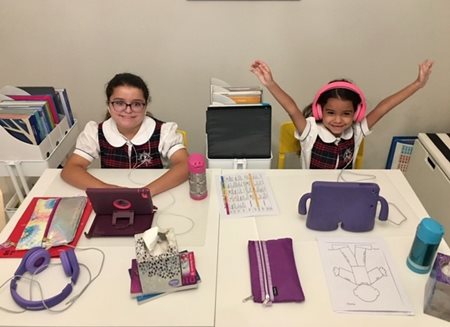When this pandemic started, few of us could have imagined that this would last into the following school year. But here we are, settling into the 2020/21 academic year, with many of us in the midst of managing virtual school again. Although it’s not the most ideal situation, there are things we can do to make the process go a bit smoother.

If you have more than one child, chances are you’re also trying to minimize disagreements between siblings. Parenting is already a challenge when they’re not in school, so when you add an entire class curriculum and the expectations that come with it, personalities can clash, and quarrels can become commonplace. With this in mind, here are five ways to reduce sibling arguments while attending virtual school.
- Review lesson plans and set expectations: Review the daily (and weekly) schedule and lesson plan with each of your children so they have an idea of what their day will look like. It’s also a good time to implement “ground rules,” so they exhibit their best behavior. For instance, no eating during class, no playing with their siblings (or pets), and no getting up from their desk without the teacher’s permission. Although teachers may already be implementing many of these class rules, take the time to review these with your child to make sure they understand what’s expected and explain how their sibling may have a different curriculum.
- Give each child their own dedicated workspace: Back in mid-March, when we started virtual school, my girls shared a desk because that’s all we had at the moment. We made it work at the time, but this year I decided to give each of them their own workspace. We purchased an identical IKEA desk, so they don’t fight over space. One of my daughters is very organized and the other tends to be messier, so it was becoming an issue. It’s also a good idea to buy them each their own school supplies, just as they would have in a traditional classroom setting. I bought them each a rolling cart from The Container Store to keep all their books, notebooks and school supplies within arm’s reach.
- Avoid comparisons: Like I mentioned earlier, one of my girls is much more organized than the other, but I try not to compare one to the other because they are both unique. Drawing a comparison can make your child feel insecure and question their abilities to do certain things. Instead, consider praising your child for a specific ability or accomplishment that made you extra proud. Every child is different, so try to focus on the positive and work with them on their weaknesses without comparing them to their sibling.
- Anticipate problems and encourage good behavior: If you see a disagreement escalating, remind them how we are all in this together. Try to encourage them to work things out and come up with a solution as a team, so that you are not resolving disputes constantly. If necessary, take your child aside and speak to him/her directly about their behavior without taking sides and encourage sharing and cooperation. Also, when they are getting along, playing together and/or working as a team, compliment them on the good behavior so they see it has not gone unnoticed.
- Listen and learn together: Most of us are not teachers, so give yourself some grace. We are doing the best we can while juggling work and other things. Don’t compare yourself to other parents, as everyone’s situation can be very different than the highlight reel shared on social media. Talk to your kids about their day, let them vent their frustrations and share their negative experiences with siblings so that you can work on things together. Being a sibling can be frustrating at times, so try to be understanding. Don’t take things too seriously and always be flexible because the day may not go as planned and that’s okay.
The virtual school experience can look very different for all parents, and chances are your story is perfectly imperfect. Arguments between siblings is completely normal. If possible, sit down for family dinners and discuss how your day went, talk through the good and the bad, listen with intent, and make adjustments as needed. Spend quality time with each child, show your love and support, and simply remind them that you are there when they need you.
I know we are still navigating our way through some rough waters so give yourself a pat on the back. You’re doing a great job and your children will appreciate you even more when this is all over.